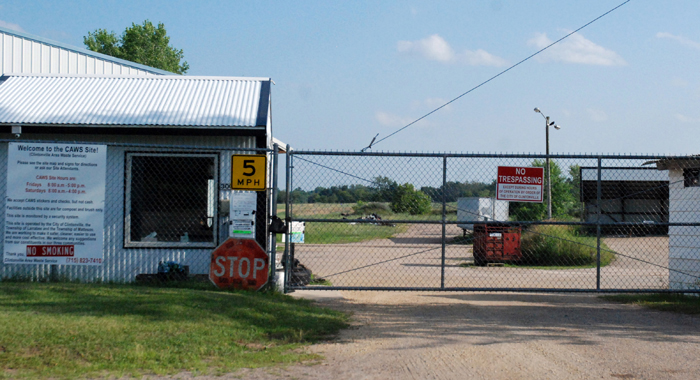
City finds discrepancies
By Bert Lehman
The city administration reviewed usage data for Clintonville Area Waste Services (CAWS) through the first six months of 2023 then shared its with the Clintonville Common Council.
The usage analysis for CAWS was presented to the council for its Sept. 12 meeting. The analysis was compiled by the city’s administration, using data from the CAWS sign-in sheets from January to June of this year.
According to the analysis, data from previous years was not available.
People bringing garbage or recycling to CAWS are required to provide information on the sign-in sheets each time they bring items to CAWS.
According to the analysis, there were discrepancies regarding the sign-in sheet information.
Discrepancies included: selection of incorrect municipalities, not selecting disposing information, incorrect addresses, and incorrect name or entity regarding usage.
Corrections were made to the sign-in sheets by the CAWS accountant, as well as city administration.
After the corrections were made, city administration claim the average usage of CAWS by city residents from January to June amounted to 37% for recycling and garbage, and 33% for garbage only.
According to the analysis, CAWS is allowing non-agreement users to use the CAWS site. Residents from the following communities had brought items to CAWS: Embarrass, Lebanon, Belle Plaine, Wyoming, Bear Creek, Marion, New London, DuPont, Shiocton, Caroline, and Mukwa.
Only the city of Clintonville and the towns of Larrabee and Mattson are in the CAWS agreement.
City administration also said that up to 9% of commercial entities use CAWS for recycling instead of contracting with a private provider.
The usage analysis also provided information about three similar sites in Waupaca County that collect garbage and recycling. These included Iola Area Recycling Center, Manawa Area Recycling Center, and Waupaca Regional Recycling Center. The sites in Iola and Manawa are subsidized, while the Waupaca facility has been self-sufficient without being subsidized.
It was also indicated in the analysis that the city of Clintonville provided a $3,337 subsidy in 2022 to the Waupaca County Recycling Implementation Council. Larrabee paid $913, while Matteson paid $651.
CAWS reaction
The CAWS Usage Analysis was also discussed by the CAWS Commission when it met Sept. 13.
At the meeting, Stacy Sonnenberg, accountant for CAWS, said she had provided city officials with all the sign-in sheets from CAWS for the usage analysis.
“There’s discrepancies in my calculations versus their (city of Clintonville) calculations,” Sonnenberg said.
Sonnenberg said because of “sloppy” writing on the sign-in sheets, she had to look up addresses of CAWS users to make sure the residence address was correct. She made these corrections in red ink on the sign-in sheets before providing them to the city.
“However, when I got the sheets back, they’re corrections were done in blue and there was a lot of no’s to a lot of the transactions that were clearly within the city.”
Originally, Sonnenberg had calculated that 44% of the visits to CAWS were by residents of Clintonville. But after making her corrections to the sign-in sheets, she said that percentage decreased to 40%-42%.
“I think they (city of Clintonville) came up with 33%,” Sonnenberg said. “And I’m not sure where the discrepancy is there, or why they just simply put ‘no.’”
Sonnenberg did acknowledge that she made a couple of mistakes making corrections, which were found by the city.
“So, I want to go back through and fix those, and kind of see where the numbers are,” Sonnenberg said.
City review
The CAWS Usage Analysis provide to Clintonville City Council members also included an administrative review as to the options available to the city of Clintonville.
The first was that the city should consider recommending a 33% of subsidy instead of 44% that was previously presented by CAWS.
Other recommendations included the city could urge the CAWS commission to:
- “Make recommendations to the municipalities executing this agreement concerning the method of operation and cost of providing waste recycling and disposal service to the citizens of the respective municipalities.”
- “Enter into agreements with other municipalities such as Counties or private enterprise for the purpose of expediting the recycling or disposal efforts.”
- Propose a change in the annual meeting from October back to August (1998 agreement) to better align with the city’s fiscal budgeting process.
For more transparency, the city recommended that the proposed CAWS budget be presented to the elected bodies of each municipality. The city claims it has not received any presentation from CAWS since at least 2020.
The city also recommended that it be allowed to review sign-in sheets when requested without delay or multiple requests.
One final option would be for the city to consider withdrawing from the CAWS agreement this year in order to not be responsible for future subsidies beyond 2024 and 2025.
